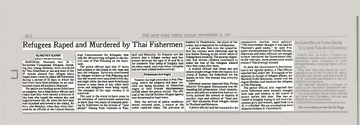
By Henry Kamm Special to The New York Times
Nov. 23, 1979
BANGKOK, Thailand, Nov. 22 Seventeen Vietnamese refugees, including four young children, were murdered by Thai fishermen at sea and most of the 37 women aboard four refugee boats raped many times by about 500 fishermen during a period of 22 days in which the survivors were held prisoner on an uninhabited island off southern Thailand.
The police are holding seven fishermen as suspects, but a high police official said today that they were merely a fraction of the men who raped the women day and night between Oct. 29, when the first boat was hijacked and towed to the island, Ko Kra, and Monday, when they were liberated by an official of the United Nations High Commissioner for Refugees, who took the 156 surviving refugees to the district seat of Pak Phanang on the mainland.
The police official said that 57 boats had stopped at the island to rob, rape and beat the refugees. Survivors interviewed by refugee workers at Pak Phanang said that the women were assaulted every day and night while the men were ferociously beaten to keep them at bay while their wives and daughters were being raped. The youngest of the rape victims is 12 years old.
The case is the worst to have come to the attention of international authorities in more than two years of constant preying by fishermen on the stream of “boat people” fleeing from Vietnam to Thai- land and Malaysia. So frequent are the attacis that a refugee worker said few women between the ages of 10 and 50 in the southern Thai camp of Songkla had not been raped, and even fewer refugees had not been robbed before arrival.
Fishermen Are Angry
Tension ran high yesterday in Pak Phanang, where the suspects and their victims are being detained, as fishermen angry at their friends’ imprisonment milled about the police station. The official of the United Nations refugee agency was threatened at least twice.
Only the arrival of police reinforcements restored calm, a source at the scene reported today. The province of Nakhon Si Thammarat, the place of the crime, has a reputation for lawlessness.
A person who flew over the island before the victims were liberated said he saw bodies floating on the water while 12 fishing boats stood by. The pirates reportedly had thrown children overboard to make the rest of the refugees aboard their boat jump after them.
A woman related that when she and others sought refuge from the rapists in a clump of bushes, the fishermen set the bushes on fire. One woman was severely burned.
Informed sources reported that Prime Minister Kriangsak Chamanand was demanding full prosecution. Until recently, police and judicial authorities had not actively pursued the stream of reports of murder, rape and robbery of “boat people” that emanates from refugee camps in Thailand and Malaysia.
A police official said the reasons for the comparative inaction were political. “The Government thought it was bad for Thailand’s good name,” he said. Frequent representations by United Nations, American and other officials are thought to have convinced the Government that, on the contrary, stern prosecution would enhance Thai prestige abroad.
To show the Government’s determination to act against piracy, a Thai official reported that either Mr. Kriangsak or his minister in charge of refugee affairs, Air Marshal Sitthi Sawatsila, would visit the region Monday and reassure the refugees at Pak Phanang.
The police official also reported that seven fishermen were recently charged with rape and robbery in the course of piracy earlier this year. One was arrested in Songkla trying to sell five Vietnamese girls and women, aged from 11 to 22, to a brothel. His six accomplices were seized in Nakhon Si Thammarat.

